
After
making our delivery of United States and foreign gold coins to Mr. Josiah K. Lilly in the spring of 1956, I discussed ways of making his collection grow. He now had
an almost complete collection of United States federal gold coins, as it was
complete in the $1, $2.50, $3 (not
including the 1870-S), $4, and virtually complete in the $5, $10 and $20. We discussed if we could complete the United States gold
series, and the chances of doing
so.
I
explained that in my opinion the few missing coins would be available within a
few years, when some other major sets or collections were marketed. The
main two coins that he still
needed were the 1870-S $3 gold (at the time part of the Eliasberg Collection) and the 1822 $5 gold. I
felt that since Amon Carter, Sr. who
died who had an 1822 $5, that was the most likely one that could be acquired.
That collector’s son, Amon Carter, Jr.,
liked paper money more than the
coins, and had indicated to us that sometime in the future that coin might be
made available. But he never set
a time for it. Mr. Lilly said, “Rome wasn’t built in a day, neither will my collection be!”
We
discussed various other areas, such as Ancient gold coins and the extensive medieval series. Mr. Lilly asked that I prepare an outline and
listing of how he should
continue, and that we continue seeking more Spanish American gold coins,
along with the few U.S. pieces needed
to finish his set. He also asked us to work on expanding his English and French coin collections.
Mr.
Lilly remarked that in the past five years he had assembled close to 2,000 different gold coins and that he had enjoyed owning these examples of
monetary history of the world.
Over
the summer and early fall of 1956, we surveyed the market and kept in weekly contact with Mr. Lilly. We made suggestions and of course answered the many questions that he
had. It was a wonderful and very enjoyable challenge to be part of this great endeavor.
In
early spring 1957, Mr. Lilly visited us to review what we had proposed
and set a date to make the delivery
to him in Indianapolis. Using our customary program, I arrived on an evening in
May in Indianapolis and was
picked up as usual at 8:30 and went directly to Eagle’s Nest to deliver the coins we had assembled.
Mr.
Lilly was pleased with what we had amassed and we discussed the various collections and I expressed how honored we were to be his sole dealer. We told him of the dealers we
worked with. Often these dealers (as well as collectors) asked us, “Who is your
client?” We of course kept it a secret, for Mr. Lilly wanted to keep private what
he was doing. Of course we followed his instructions to the letter. We even had a story we used for
a few dealers who made special
efforts to assist us, telling them
that we had several different clients, one who liked doubloons, another who
like United States gold, another who
collected Ancients, another who liked England and France, etc. It may seem a fantastic story, but it was
believed, even though our want
lists showed various forms of specialization. We did the same for other clients who desired anonymity. We
kept their secrets and in that way kept the confidence of the collectors we dealt with.
During
his late fall 1957 visit to Stack’s, while on his way to Florida, we
reviewed some of the ideas we had. We had a set of the 12 Caesars in gold, a few Ancient Greek gold coins, as well as a
Daric, issued in the 7th century
B.C. (an example of the first gold coin), a few Byzantine and early Medieval specimens, as well as another
group of Spanish American doubloons.
We
reviewed the material, set a program for expansion of the collection, and Mr. Lilly left us for his winter in Florida. We worked all
fall, winter of 1957, into the early winter and spring of 1958, continuing our quest to expand the J.K. Lilly
Collection into a world-class cabinet.





